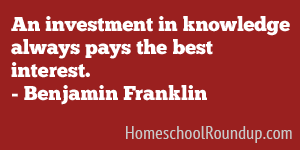Unschooling Method
 Based on the teachings of John Holt, unschooling allows children to take control of their educational choices. Unschooling is student-directed instead of teacher-directed. Unschoolers often take issue with the current, expert-based education system, choosing instead to trust the individual’s ability to guide their own education by following their interests. Focus on a child’s natural desire to learn as they experience life.
Based on the teachings of John Holt, unschooling allows children to take control of their educational choices. Unschooling is student-directed instead of teacher-directed. Unschoolers often take issue with the current, expert-based education system, choosing instead to trust the individual’s ability to guide their own education by following their interests. Focus on a child’s natural desire to learn as they experience life.
- Quote from the Natural Child Project website: “What it isn’t: Unschooling isn’t a recipe, and therefore it can’t be explained in recipe terms. Unschooling isn’t a method, it is a way of looking at children and at life. It is based on trust that parents and children will find the paths that work best for them – without depending on educational institutions, publishing companies, or experts to tell them what to do. Unschooling does not mean that parents can never teach anything to their children, or that children should learn about life entirely on their own without the help and guidance of their parents. Unschooling does not mean that parents give up active participation in the education and development of their children and simply hope that something good will happen. Finally, since many unschooling families have definite plans for college, unschooling does not even mean that children will never take a course in any kind of a school. Quote: Our son has never had an academic lesson, has never been told to read or to learn mathematics, science, or history. Nobody has told him about phonics. He has never taken a test or has been asked to study or memorize anything. When people ask, “What do you do?” My answer is that we follow our interests – and our interests inevitably lead to science, literature, history, mathematics, music – all the things that have interested people before anybody thought of them as “subjects”.
- The goal is to teach them to think for themselves, train them in practical life skills and allow them to be self-educating.
- Steve Wozniak, inventor of the Apple Computer, once said: “Do what you love, and learn to do it very, very well, and some day someone will pay you very, very well to do it for them!” I think this goes very well with the unschooler’s philosophy.
This teaching method might work well for you/your student if you:
- don’t mind not having a set scope and sequence and structure to your child’s learning,
- want your child to have the freedom to follow her own interests,
- have enough confidence in the process of learning that you don’t mind if not all of your child’s learning can be documented by a written test,
- see a value in having your child develop expertise in an interest, and are willing to let other activities take second place, at least for a season,
- have a child who has interests, hobbies or collections they want to pursue.
Further reading on unschooling:
The Unschooling Unmanual
Unschooling: A Lifestyle of Learning
The Unschooling Handbook : How to Use the Whole World As Your Child’s Classroom







No Comments